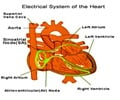A breakthrough study has proved that ablation therapy system that freezes heart tissue with a balloon catheter to treat a common heart rhythm disorder more effective.
A breakthrough study has proved that ablation therapy system that freezes heart tissue with a balloon catheter to treat a common heart rhythm disorder is far more effective than drug therapy.
Researchers compared the safety and efficacy of the Arctic Front CryoAblation Catheter System produced by US firm Medtronic to drug therapy over at least one year in 245 patients in the United States and Canada.A year after the non-surgical procedure, nearly 70 percent of patients treated by the system no longer suffered from paroxysmal atrial fibrillation.
Only seven percent of patients treated with traditional drug therapy, which can have significant secondary effects, no longer experience the irregular heart rhythm that starts and stops on its own.
Patients randomly received ablation therapy or commonly used drug treatments for the trial, whose results were presented at the 59th annual conference of the American College of Cardiology in Atlanta, Georgia.
For every three participating patients, about two received ablation therapy and one received drug treatment.
Researchers, led by Douglas Packer of the Mayo Clinic in Rochester, Minnesota, will submit their results to be considered for the US Food and Drug Administration (FDA) to approve the Medtronic system. FDA approval would give the procedure access to the US market.
Advertisement
Atrial fibrillation, which affects over seven million people worldwide, is responsible for inefficient pumping of the heart and can provide other heart rhythm problems, heart failure and chronic fatigue.
Advertisement
The balloon is then filled with a liquid cooled at very low temperature to cryogenically destroy the tissue where the anomaly takes place.
Only about three percent of the patients treated with the Medtronic system suffered serious complications related to a narrowing pulmonary vein. Yet some 98 percent of those cases were remediated during the 12-month follow-up period.
Although it is considered experimental and is not currently available for sale in the United States, the Medtronic procedure is already available commercially in Europe and Australia.
Source-AFP
SRM













